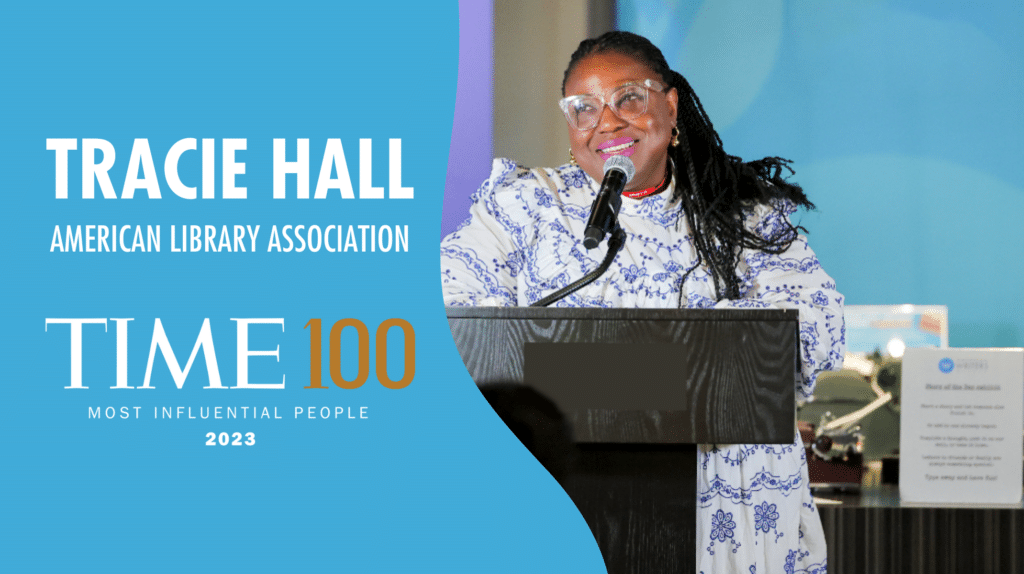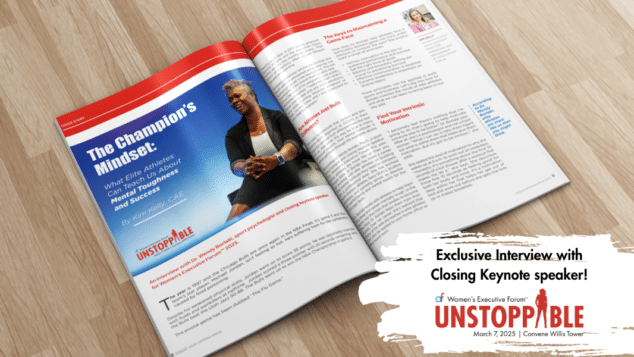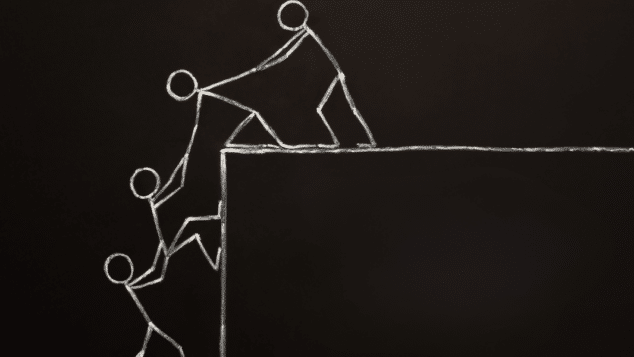Tracie Hall Will Change the Way You Think About Association Management

“Free people read freely.”
Tracie Hall repeated that phrase three times during her powerful speech at the 2023 TIME100 Gala earlier this year. Hall is the executive director of the American Library Association (ALA) and a 2023 TIME100 Icon. We see her as a new power leader.
The TIME100 list is an annual selection of the 100 most influential people in the world, assembled by the editors at the news magazine Time. In 2007, managing editor Richard Stengel clarified that TIME100 focused on influence rather than popularity, saying: “Influence is hard to measure, and what we look for is people whose ideas, whose example, whose talent, whose discoveries transform the world we live in. Influence is less about the hard power of force than the soft power of ideas and example.”
Association Forum spoke with Hall about her leadership style and her journey from directing a homeless shelter to enrolling in library school to leading the oldest and largest library association in the world.
Note: this interview has been edited for length and clarity.
Tell us a little bit about what the idea of new power leadership means to you and how you see it playing out at the American Library Association (ALA)?
My mandate, of course, is our mission—which is ultimately to provide access to learning and information for all. I have to think about the fact that we are living in a time where the “for all” part of that, is being problematized.
And the “for all” part of that is being seen by some groups as reverse discrimination, or somehow countering racism with another form of bias. Or is that “for all” going to lead to too much sharing of power and wealth in a way that upsets the apple cart of racialized capitalism? Today, when we say “American,” what we know is that we’re talking about everyone who calls this country home, with all our demographic variables and not just a few.
I’ve been really clinging to ALA’s mission. But I’ve also been making sure that my colleagues not only understand, but wrangle with the fact that to do our work and to carry out our mission today is probably going to open us up to more scrutiny, more politicization, and more weaponized responses than it has in the past. This is due to censorship, recent court decisions cracking down on affordable access to education, and the narrowing gateways to people of color and first-generation students that we must find a way to address.
Tell us more about the politicization of libraries and how that’s affected the ALA directly.
Well, we’ve had to think strategically because a lot of our member organizations are dependent on funding at the federal, state, and local level—but chiefly the local level, right? As we navigate the culture wars, we’ve seen more politicians—especially newer ones or ones who are aspiring to higher office—take very politically motivated, very public, stances of being pro-censorship and challenge materials in public and school libraries based on LGBTQIA and BIPOC content, even the most highly regarded works of literature.
We have to balance acting on our values around intellectual freedom and the right to read—and we are going to continue to do that unequivocally—but also doing that in a way that is strategic and service focused so that we don’t fall into the trap of being put on the defensive, or putting libraries on the defensive.
We’ve had to be guided by what it means to be an association, as opposed to another type of nonprofit, which is that it is our duty to sustain the library and information services profession and to preserve libraries as facilitators of learning, civic access, and community building.
It seems the politics found you, but you still need to take a stance to protect your members.

It isn’t about being political, it is about trying to ensure that enhancing learning and ensuring information access for all is real for us.
All associations are grappling with expanding diversity and inclusion. We can’t see that as political or even altruistic. We must see that as part of our sustainability plan.
We talk about sustainability a lot at Association Forum. Demographics are shifting within the United States, but also within many of the professions we serve. If associations can’t catch up to those changes, then where will their place be?
Yes, and younger members understand this. One thing we must think about is not that a younger generation is going to think more broadly throughout the course of their life, it’s just that the problems they face are going to become more complex. And we must prepare the next generation of professionals to deal with those problems, and opportunities, as they arise.
Tell us a little bit about your leadership style and how it has formed over the course of your life.
One thing that’s for sure is I was raised in a household that valued community service. My maternal grandparents are products of the Great Migration, coming from Louisiana to Los Angeles for financial opportunities and to escape the brutality of the Jim Crow racism they were experiencing there.
When they came to LA, like a lot of people, they lived in unstable housing. This was the 1940’s, and if you can imagine, they were living in garages. They had four kids and neither my granddad nor grandmother were fully literate. My grandmother would go to the company to pay her bills. I realized the reason she did that instead of mailing them is because she didn’t write well, and she needed somebody to tell her “You owe $51.”
And so, when they finally got a house in LA, they opened it to people coming up from the South or people who were poor or unhoused. I grew up with that kind of service ethic. To me it was an expectation that you shared what you had and that you didn’t abandon people in need.
As I went to college and started to become aware of more political movements and activist movements—I spent a year as a student abroad in East Africa and that is where I became very aware of the gulf that existed between the rich and the poor, because there wasn’t a middle class as such.
I saw a lot by the time I was 20—I had my own lived experience and I had observed more of the world. I traveled a lot and I saw some devastating poverty and the impact on public health. I think that formed in me a social consciousness and I wasn’t interested in ever working in an environment that wouldn’t allow me to act on that. I have to do the work of justice because I’ve seen what the absence of justice creates.
I directed a homeless shelter in LA after I graduated with my first masters degree. I saw literacy as one of the reasons why people were caught in the poverty cycle or facing housing precarity. That eventually inspired me to go to library school.
What went through your mind when you found out you were chosen as one of Time’s 100 most influential people?
Oh wow. It’s funny because you aren’t thinking about awards when you’re working, right? I instantly recognized that it wasn’t about me at all. It was about the field. It’s about the fact that librarianship, that libraries and books and even ideas, are being considered contraband. We’re living in a time when some people consider intellectual freedom and critical thinking to be dangerous. As odd as it seems, we are living in a time where people are creating laws to make access to ideas less available to the average person.
Libraries are on the frontline of that conversation; they’re on the frontline of that debate in our society today. So, after I got over my disbelief, I realized that it wasn’t about me as much as it is about the fact that the American Library Association and the libraries and librarians we serve are on the frontlines of this conversation.
It’s been one of the most humbling experiences, but it’s been easier to carry because I know I carry it with ALA’s membership and the more than 300,000 people who work in our sector.
It’s wild that we’re still having conversations about censorship and banning books in 2023, isn’t it?

Today we have to see what’s happening in this country as part of a continuum. We see rising groups—we see the BIPOC (Black, Indigenous, and People of Color) community being a rising majority—and we also see more women gaining access to the halls of power. And so, yes, there’s definite forces that want to clamp down on that.
You said this award means a lot to the library industry. What do you think it means for the association industry?
I hadn’t thought about that. That’s a good question. I think what it means for the library community is that it recognizes that librarians have always been, to some degree, agents of civic change. I accept the award as a librarian, but as an association leader, I think it says the same—that our associations are vehicles of civic engagement, civic access, and also civic change.
What do you see as the most pressing issue facing association leaders right now?
I think it’s really important that we are able to steward the notion of the association through these times of deep socio-political divide and economic instability and change. The association has a very specific function in the evolution of contemporary society. Not only does it codify techniques and certain types of knowledge, but it also sets collective standards of how we work and the values that we hold as professions.
And that’s really important today because we have fewer and fewer places where we can collectively congregate, share ideas, debate, and co-create. I think the association of today actually plays an outsized role.
I think a challenge is going to be to preserve the notion of the association so it can be an intentional vehicle for social good. I think another challenge is going to be to continue to build our membership numbers, because that is the body that gives us our strength.. I believe in the social responsibility that comes with collectivizing as an association and I see growing association membership as a form of movement building.
Great. Anything else you want to add?
I think it would behoove associations to do a better job of opening pathways to association management and leadership. It’s a career that people fall into. I do a lot of informational interviews with people who want to work in nonprofit management.
A lot of the people who aspire to service or who are motivated by social responsibility and social justice don’t know a lot about associations. We have to build a deeper bench of talent and not wait until people stumble upon the association field.
Agreed! Where do you find inspiration?
From the community. I find a lot of inspiration from young people. I have always loved young people—especially children and teenagers. It’s not an accident that I started my library career in young adult services and working with youth. I think there’s this moment, especially in adolescence, where you are asking big questions and have this deep belief that you should be wrangling with big questions and acting on big ideas. There’s something about that time period where possibility seems infinite.
That has always attracted me. I get a lot of inspiration from young people, but also from where I grew up and my family’s past. It’s not only the trials that they’ve been through, but also the way they made it through them. I believe that I’m paying forward what my family invested in me. And it is my responsibility to make the dreams that they held, some of which they could not act on, come to fruition. That’s not just about career attainment, but also how I give back to the community because that was a value my family held highest.
I want to live my life in a way that is generative. Thinking about my family’s sacrifices, thinking about the possibilities young people create—all those things are driving forces and sources of inspiration.
Tags
Related Articles
The Champion’s Mindset: What Elite Athletes Can Teach Us About Mental Toughness and Success
An interview with Dr. Wendy Borlabi, sport psychologist and closing keynote speaker for Women’s Executive...
Great Bosses, Greater Impact: Leadership Lessons that Stick
The best bosses leave more than instructions—they leave echoes of confidence, creativity, and leadership that...
The Secret to Building a Strong, Reliable Professional Network
Authenticity, shared vulnerability, and common interests are the keys to creating a network that truly...




